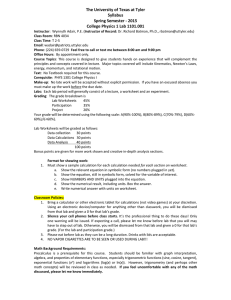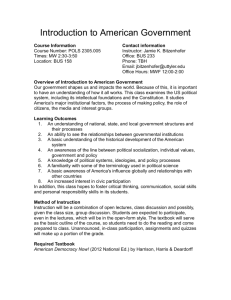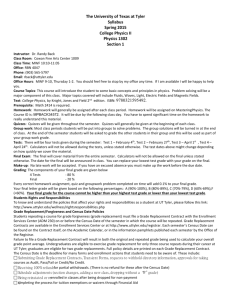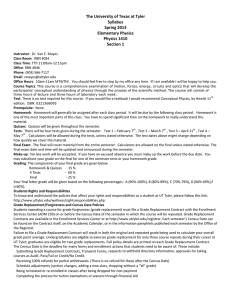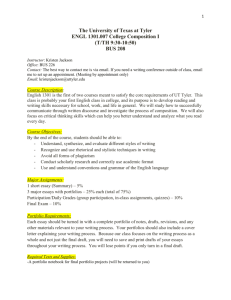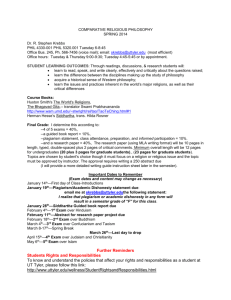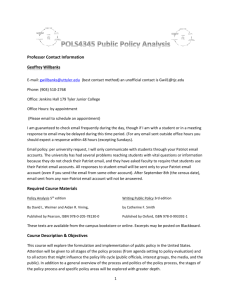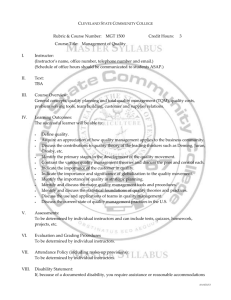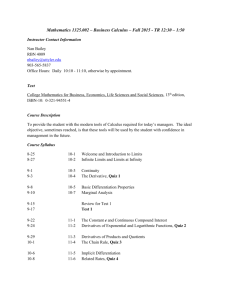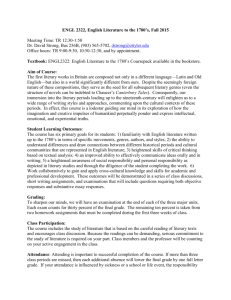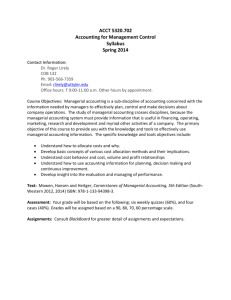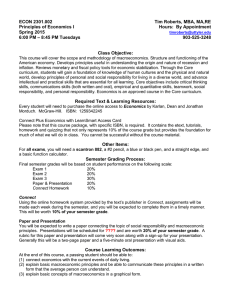POLS 2305.001 Introduction to American Government
advertisement
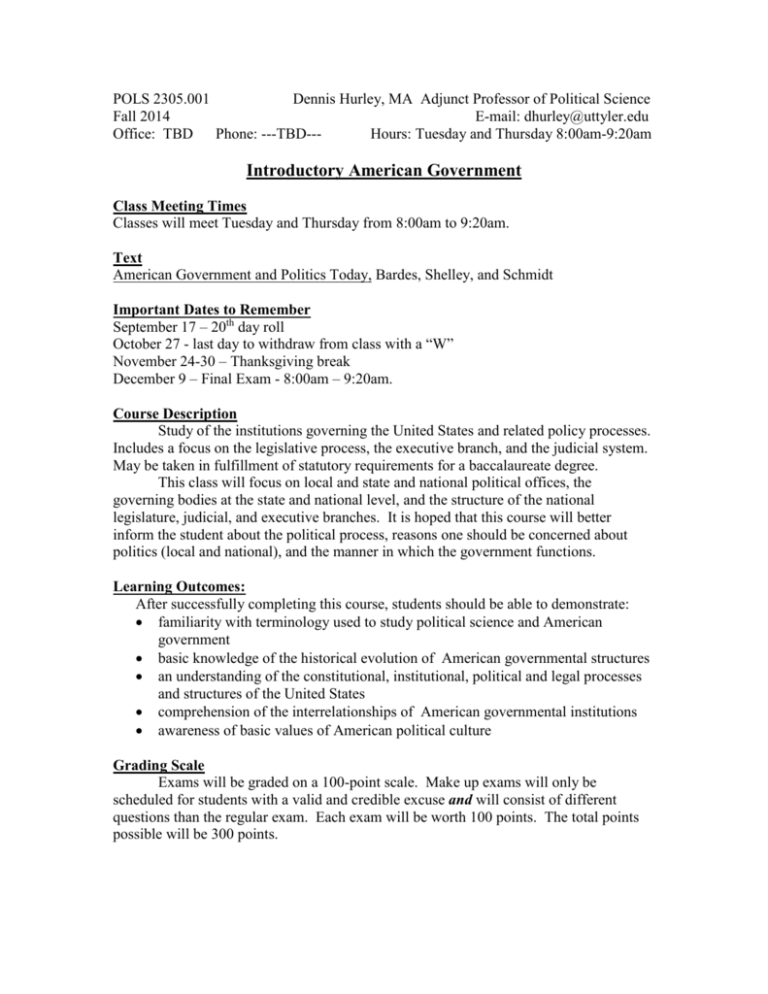
POLS 2305.001 Dennis Hurley, MA Adjunct Professor of Political Science Fall 2014 E-mail: dhurley@uttyler.edu Office: TBD Phone: ---TBD--Hours: Tuesday and Thursday 8:00am-9:20am Introductory American Government Class Meeting Times Classes will meet Tuesday and Thursday from 8:00am to 9:20am. Text American Government and Politics Today, Bardes, Shelley, and Schmidt Important Dates to Remember September 17 – 20th day roll October 27 - last day to withdraw from class with a “W” November 24-30 – Thanksgiving break December 9 – Final Exam - 8:00am – 9:20am. Course Description Study of the institutions governing the United States and related policy processes. Includes a focus on the legislative process, the executive branch, and the judicial system. May be taken in fulfillment of statutory requirements for a baccalaureate degree. This class will focus on local and state and national political offices, the governing bodies at the state and national level, and the structure of the national legislature, judicial, and executive branches. It is hoped that this course will better inform the student about the political process, reasons one should be concerned about politics (local and national), and the manner in which the government functions. Learning Outcomes: After successfully completing this course, students should be able to demonstrate: familiarity with terminology used to study political science and American government basic knowledge of the historical evolution of American governmental structures an understanding of the constitutional, institutional, political and legal processes and structures of the United States comprehension of the interrelationships of American governmental institutions awareness of basic values of American political culture Grading Scale Exams will be graded on a 100-point scale. Make up exams will only be scheduled for students with a valid and credible excuse and will consist of different questions than the regular exam. Each exam will be worth 100 points. The total points possible will be 300 points. The grading scale will be the following: 270 - 300 points = A 240 - 269 points = B 210 - 239 points = C 180 - 209 points = D 179 and below = F Course Outline Week 1 2 3 4 5 6 11 12 13 14 15 Beginning August 26 September 2 September 9 September 16 September 23 September 30 --October 7 October 14 October 21 October 28 --November 4 November 11 November 18 November 25 December 2 16 December 9 7 8 9 10 Description Introduction to Politics and Government Chapter 1, The Democratic Republic Chapter 2, Constitution Chapter 3, Federalism Chapter 4, Civil Liberties Chapter 5, Civil Rights Test 1, Thursday October 2 Chapter 6, Public Opinion and Political Socialization Chapter 7, Interest Groups Chapter 8, Political Parties Chapter 9, Campaigns, Elections and the Media Test 2, Thursday October 30 Chapter 10, Congress Chapter 11, The President, Chapter 12, The Bureaucracy Chapter 13, The Courts Thanksgiving Break Chapter 14, Domestic and Economic Policy Chapter 15, Foreign Policy Test 3, Final Exam, Tuesday 8am We will adhere to this schedule as closely as possible. In the event that the class gets behind I will reschedule tests at least 1 week in advance. It is the students’ responsibility to attend class in order to keep current with all schedule changes. Class Etiquette and Expectations In my experience most people understand that in college there are expectations that the student should act as an adult in the classroom. Most of the time students conduct themselves with good manners and are greeted with respect from their fellow students as well as the instructor. However, from time to time a social “problem child” slips in and disrupts the classroom. To keep such disturbances to a minimum I will briefly give my expectations of the students in the classroom. Tardiness is understood; sometimes we simply cannot help being late. If you must enter the class late please do so quietly and do not let tardiness become a habit. Please turn cell phones and pagers off before entering class. An occasional ring or two will not terribly bother me, but don’t let it become a habit as well. Please don’t talk to other students in class or text message friends! It is disruptive and disrespectful to the professor and other students in class. Students are expected to remain polite during classroom discussions. Even during heated debates, you must treat your classmates with respect. For example, you should not make derogatory remarks about your classmates’ ideas. Instead, explain why you think they are wrong, backing up your viewpoint with sound logical analysis and refraining from personal attacks. Students should remain quiet while someone else (including your instructor!) has the floor. Class Attendance: Experience shows me that students that diligently attend their classes and keep good notes tend to make high grades in their coursework, whereas students that are lax in their attendance and/or do not take lecture notes tend to make poor or failing grades in their classes. Remember this when you come to me wondering why you are failing this course. My first two questions will be are you attending class and are you taking good notes? Disability Statement: "If you have disability, including a learning disability, for which you request an accommodation, please contact Ida MacDonald in the Disability Support Services offices so that the appropriate arrangements may be made. In accordance with federal law, a student requesting accommodation must provide documentation of his/her disability to the Disability Support Services counselor. For more information, call or visit the Student Services Center located in the University Center, Room 111. The telephone number is 566-7079 (TDD 565-5579)." Academic Honesty I have a pretty simple policy, DO NOT CHEAT OR PLAGERIZE. Doing so will result in the immediate failure of the class. Students Rights and Responsibilities To know and understand the policies that affect your rights and responsibilities as a student at UT Tyler, please follow this link: http://www2.uttyler.edu/wellness/rightsresponsibilities.php Grade Replacement/Forgiveness and Census Date Policies Students repeating a course for grade forgiveness (grade replacement) must file a Grade Replacement Contract with the Enrollment Services Center (ADM 230) on or before the Census Date of the semester in which the course will be repeated. Grade Replacement Contracts are available in the Enrollment Services Center or at http://www.uttyler.edu/registrar. Each semester’s Census Date can be found on the Contract itself, on the Academic Calendar, or in the information pamphlets published each semester by the Office of the Registrar. Failure to file a Grade Replacement Contract will result in both the original and repeated grade being used to calculate your overall grade point average. Undergraduates are eligible to exercise grade replacement for only three course repeats during their career at UT Tyler; graduates are eligible for two grade replacements. Full policy details are printed on each Grade Replacement Contract. The Census Date is the deadline for many forms and enrollment actions that students need to be aware of. These include: Submitting Grade Replacement Contracts, Transient Forms, requests to withhold directory information, approvals for taking courses as Audit, Pass/Fail or Credit/No Credit. Receiving 100% refunds for partial withdrawals. (There is no refund for these after the Census Date) Schedule adjustments (section changes, adding a new class, dropping without a “W” grade) Being reinstated or re-enrolled in classes after being dropped for non-payment Completing the process for tuition exemptions or waivers through Financial Aid State-Mandated Course Drop Policy Texas law prohibits a student who began college for the first time in Fall 2007 or thereafter from dropping more than six courses during their entire undergraduate career. This includes courses dropped at another 2-year or 4-year Texas public college or university. For purposes of this rule, a dropped course is any course that is dropped after the census date (See Academic Calendar for the specific date). Exceptions to the 6-drop rule may be found in the catalog. Petitions for exemptions must be submitted to the Enrollment Services Center and must be accompanied by documentation of the extenuating circumstance. Please contact the Enrollment Services Center if you have any questions. Disability Services In accordance with Section 504 of the Rehabilitation Act, Americans with Disabilities Act (ADA) and the ADA Amendments Act (ADAAA) the University offers accommodations to students with learning, physical and/or psychiatric disabilities. If you have a disability, including non-visible disabilities such as chronic diseases, learning disabilities, head injury, PTSD or ADHD, or you have a history of modifications or accommodations in a previous educational environment you are encouraged to contact the Student Accessibility and Resources office and schedule an interview with the Accessibility Case Manager/ADA Coordinator, Cynthia Lowery Staples. If you are unsure if the above criteria applies to you, but have questions or concerns please contact the SAR office. For more information or to set up an appointment please visit the SAR office located in the University Center, Room 3150 or call 903.566.7079. You may also send an email to cstaples@uttyler.edu Student Absence due to Religious Observance Students who anticipate being absent from class due to a religious observance are requested to inform the instructor of such absences by the second class meeting of the semester. Student Absence for University-Sponsored Events and Activities If you intend to be absent for a university-sponsored event or activity, you (or the event sponsor) must notify the instructor at least two weeks prior to the date of the planned absence. At that time the instructor will set a date and time when make-up assignments will be completed. Social Security and FERPA Statement: It is the policy of The University of Texas at Tyler to protect the confidential nature of social security numbers. The University has changed its computer programming so that all students have an identification number. The electronic transmission of grades (e.g., via e-mail) risks violation of the Family Educational Rights and Privacy Act; grades will not be transmitted electronically. Emergency Exits and Evacuation: Everyone is required to exit the building when a fire alarm goes off. Follow your instructor’s directions regarding the appropriate exit. If you require assistance during an evacuation, inform your instructor in the first week of class. Do not re-enter the building unless given permission by University Police, Fire department, or Fire Prevention Services.
